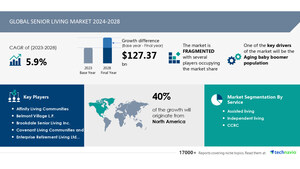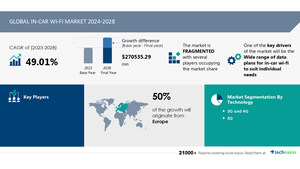NEW YORK, Nov. 20, 2024 /PRNewswire/ -- Report on how AI is redefining market landscape - The global commercial combi ovens market size is estimated to grow by USD 1.52 billion from 2024-2028, according to Technavio. The market is estimated to grow at a CAGR of 10.87% during the forecast period. Growing inclination toward combi ovens with energy-efficient features is driving market growth, with a trend towards growing inclination toward commercial mini combi ovens. However, issues associated with corrosion of commercial combi ovens poses a challenge.Key market players include Ali Group S.r.l., Alto Shaam Inc., Angelo Po Grandi Cucine Spa, Baxter International Inc., Electrolux Professional AB, Eloma GmbH, EssEmm Corp., Fagor Industrial S. Coop, HANGZHOU ROBAM APPLIANCES Co. Ltd., Henny Penny Corp., HOUNO AS, Illinois Tool Works Inc., Maschinenfabrik Kurt Neubauer GmbH and Co. KG, PALUX Aktiengesellschaft, RATIONAL Group, RETIGO Sro, The Manitowoc Co. Inc., The Middleby Corp., UNOX Spa, and WELBILT INC..
AI-Powered Market Evolution Insights. Our comprehensive market report ready with the latest trends, growth opportunities, and strategic analysis- View Free Sample Report PDF
Forecast period |
2024-2028 |
Base Year |
2023 |
Historic Data |
2018 - 2022 |
Segment Covered |
Product (Commercial combi ovens with boiler and |
Region Covered |
Europe, North America, APAC, South America, and |
Key companies profiled |
Ali Group S.r.l., Alto Shaam Inc., Angelo Po Grandi |
Key Market Trends Fueling Growth
The Commercial Combi Oven market is thriving with trends like Convection ovens, Steamers, Grills, and the integration of Smart Technology. Chefs in Restaurants and Fast Food places benefit from these ovens' temperature control and cook times, allowing them to prepare quality dishes for diverse customer bases, including vegetarian options and plant-based meals. Combi Ovens offer Recipe databases, Humidity control, and Multi cooking capabilities, enhancing the culinary experience. Energy efficiency is a priority in the Foodservice sector, with Energy efficient appliances and IoT connectivity reducing electricity consumption. Food safety regulations guide the market, with Middle Class population growth driving demand for Cupcakes, Muffins, and other baked goods. Industrial Automation and Self-cleaning features streamline kitchen operations, while Skilled Operators ensure consistent quality. The market caters to various sectors, including Full Service Restaurants, Fast Service Restaurants, Cruise Ships, Retail Stores, and Production Plants. Sustainable kitchen equipment, such as Boilerless models and Gas-powered ovens, align with the Hospitality sector's focus on Food quality, Hygiene, and Zero Waste Cooking. Gastronomic innovation continues, with Insulation materials, Heat recovery systems, and Liquid detergents optimizing performance and reducing Maintenance time.
Commercial mini combi ovens, also known as compact combi ovens, offer a space-saving solution for commercial kitchens. These ovens require less floor space compared to standard models, making them an affordable choice for small-sized businesses in the foodservice industry. Notable vendors, such as WELBILT, RATIONAL, and Ali Group, provide commercial mini-combi ovens. For instance, RATIONAL offers a mini-combi oven that measures only 21.85-inches deep, 25.79-inches wide, and 22.32-inches high. This compact size caters to the needs of small restaurants, bakeries, and other foodservice establishments. Other vendors, like WELBILT and Ali Group, also provide similar space-efficient solutions.
Insights on how AI is driving innovation, efficiency, and market growth- Request Sample!
Market Challenges
- The Commercial Combi Oven market faces several challenges in the Foodservice sector. Convection ovens, steamers, and grills are essential for professional food preparation, but each cooking method requires different skills from Chefs. Temperature control is crucial for quality dishes, especially in restaurants and fast food places. Recipe databases and smart technology, including artificial intelligence and the Internet of Things, can help streamline cooking processes. However, commercial kitchens must comply with food safety regulations, making energy-efficient appliances a priority. Middle class population growth drives demand for vegetarian options, plant-based meals, and fermented veggies, requiring versatile equipment like Commercial Combi Ovens. Boilers and LPG-powered appliances are common in large-scale foodservice establishments, such as cruise ships and production plants. Skilled operators are necessary for handling complex Commercial Combi Ovens, which can offer humidity control, industrial automation, and multi-cooking capabilities. Energy consumption is a concern, with electrical power units and insulation materials playing a role in reducing carbon emissions. Sustainable kitchen equipment, such as steam-generated ovens and boilerless models, is gaining popularity in the hospitality sector. Cafes, catering businesses, and retail stores in the organized retail sector also use Commercial Combi Ovens for cooking methods like combination cooking, steaming, and convection. Cooking times, quality control, and food waste are essential factors for these businesses, which often prioritize self-cleaning models and maintenance time. In conclusion, the Commercial Combi Oven market faces challenges in meeting the diverse needs of the foodservice industry, from traditional ovens to gas-powered and electric models, and from culinary experiences to energy efficiency and sustainability.
- Commercial combi ovens are essential kitchen appliances that offer the combined functionality of conventional heat cooking and steam cooking. These ovens require water to generate steam, making stainless steel, the primary material for their manufacturing, susceptible to corrosion. The water used for steam creation may contain chlorine and chloramines, which are disinfectants that safeguard against water-borne diseases. However, these disinfectants can lead to corrosion in commercial combi ovens. At high temperatures, chlorides, a component of chlorine and chloramines, can be corrosive to stainless steel. Additionally, other impurities like elevated levels of sodium, sulfates, food deposits, and improper cleaning chemicals can contribute to the corrosion process. It is crucial for commercial kitchens to implement regular maintenance practices to mitigate the potential damage caused by these impurities and ensure the longevity of their combi ovens.
Insights into how AI is reshaping industries and driving growth- Download a Sample Report
Segment Overview
This commercial combi ovens market report extensively covers market segmentation by
- Product
- 1.1 Commercial combi ovens with boiler
- 1.2 Commercial boiler-less combi ovens
- End-user
- 2.1 Foodservice sector
- 2.2 Institutional sector
- 2.3 Retail sector
- 2.4 Others
- Geography
- 3.1 Europe
- 3.2 North America
- 3.3 APAC
- 3.4 South America
- 3.5 Middle East and Africa
1.1 Commercial combi ovens with boiler- Commercial combi ovens with boilers are popular in high-volume food preparation settings due to their rapid heat-up capacity. These ovens utilize boiler-based steam generators, which can produce large quantities of steam for cooking. The boilers maintain the water at the required temperature, enabling the door to be opened for food placement even during operation. Leading vendors, such as RATIONAL, WELBILT, and Middleby, provide commercial combi ovens with boilers using high-quality raw materials for enhanced durability. Middleby, under its G.S. BLODGETT brand, offers commercial combi ovens with boilers featuring dual water inlet standards and brass fittings (NPT) for long-lasting performance and leak-proof joints. Despite higher utility costs due to continuous water supply, commercial combi ovens with boilers are preferred for their quick cooking capabilities. The increasing demand for high-volume food production in restaurants and food outlets is expected to fuel the growth of the commercial combi ovens market with boilers during the forecast period.
Download complimentary Sample Report to gain insights into AI's impact on market dynamics, emerging trends, and future opportunities- including forecast (2024-2028) and historic data (2018 - 2022)
Research Analysis
Commercial combi ovens are a versatile and essential piece of kitchen equipment for restaurants, fast food places, professional kitchens, and catering businesses. These ovens combine the functions of a convection oven, steamer, and grill in one unit, allowing chefs to prepare a wide range of dishes with ease. With advanced temperature control and humidity control features, combi ovens enable precise cooking times for various dishes, from continental cuisine to industrial automation in the foodservice industry. Recipe databases and smart technology make it simple for chefs to access and save their favorite recipes, while self-cleaning functions and liquid detergents minimize maintenance time. With cook times optimized for quality control and food waste reduction, commercial combi ovens are an indispensable tool for any professional kitchen.
Market Research Overview
Commercial Combi Ovens: Revolutionizing Professional Food Preparation in the Foodservice Industry Commercial combi ovens are a game-changer in the foodservice sector, combining convection, steaming, and grilling capabilities in one appliance. These versatile ovens cater to various culinary experiences, from traditional dishes to vegetarian options, plant-based meals, and fermented veggies. They enable professional kitchens to prepare homemade bread, zero waste cooking, and a wide range of baked goods like cupcakes and muffins. With smart technologies, artificial intelligence, and IoT connectivity, commercial combi ovens offer temperature control, recipe databases, and energy efficiency. They meet food safety regulations and cater to the growing middle class population's demand for quality dishes. The foodservice industry benefits from energy-efficient appliances, reducing electricity consumption and carbon emissions. From full-service restaurants and fast-food places to cafes, catering businesses, and production plants, combi ovens are essential kitchen equipment. They provide humidity control, industrial automation, and multi-cooking capabilities, enabling skilled operators to deliver consistent food quality, hygiene, and dining out experiences. In the hospitality sector, combi ovens support sustainable kitchen equipment, steam-generated ovens, boilerless models, and gas-powered ovens. They offer energy-efficient models and insulation materials, ensuring efficient kitchen operations and reducing maintenance time. Gastronomic innovation thrives with combi ovens, offering a wide range of cooking methods for dishes like salmon fillets and various cuisines, including continental.
Table of Contents:
1 Executive Summary
2 Market Landscape
3 Market Sizing
4 Historic Market Size
5 Five Forces Analysis
6 Market Segmentation
- Product
- Commercial Combi Ovens With Boiler
- Commercial Boiler-less Combi Ovens
- End-user
- Foodservice Sector
- Institutional Sector
- Retail Sector
- Others
- Geography
- Europe
- North America
- APAC
- South America
- Middle East And Africa
7 Customer Landscape
8 Geographic Landscape
9 Drivers, Challenges, and Trends
10 Company Landscape
11 Company Analysis
12 Appendix
About Technavio
Technavio is a leading global technology research and advisory company. Their research and analysis focuses on emerging market trends and provides actionable insights to help businesses identify market opportunities and develop effective strategies to optimize their market positions.
With over 500 specialized analysts, Technavio's report library consists of more than 17,000 reports and counting, covering 800 technologies, spanning across 50 countries. Their client base consists of enterprises of all sizes, including more than 100 Fortune 500 companies. This growing client base relies on Technavio's comprehensive coverage, extensive research, and actionable market insights to identify opportunities in existing and potential markets and assess their competitive positions within changing market scenarios.
Contacts
Technavio Research
Jesse Maida
Media & Marketing Executive
US: +1 844 364 1100
UK: +44 203 893 3200
Email: [email protected]
Website: www.technavio.com/
SOURCE Technavio

WANT YOUR COMPANY'S NEWS FEATURED ON PRNEWSWIRE.COM?
Newsrooms &
Influencers
Digital Media
Outlets
Journalists
Opted In






Share this article